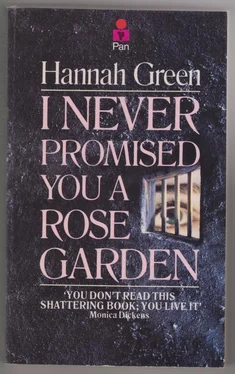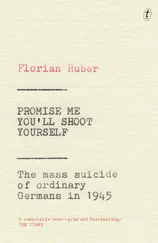“Oh, Deborah! Health is not simply the absence of sickness. We never worked this hard just so that you might be unsick!”
Again Dr. Fried yearned silently as if before a blind patient to whom she was trying to prove the color of light. If only Deborah could know what a life of reality and experience means !
“If I gave you a picture of Lactamaeon in his hawk aspect or as a rider, would you look at it as my old nuttiness, or as a …contribution’?”
“I would have to see it first,” Furii said. “All right then,” Deborah said, “perhaps I might begin to open Yr.”
* * *
STATE DEPARTMENT OF EDUCATION
High-School Equivalency Examination
The high-school equivalency examinations will be given on May 10th at the County Courthouse.
As a registrant for these examinations you will be required to fill out and send in the appended forms and be present at the County Courthouse on Tuesday, May 10th at 9:00 A.M. Failure to comply with both of these requirements will disqualify you for certification.
Deborah put the notice on one side of the table and on the other, the sketches for a picture of Anterrabae. She had taken the notice from its envelope quickly, surprised that the time for it had come so soon. She had filled out the enclosure immediately, had looked twice to see that the address was right, and had gone out to mail it right away, lest it be forgotten or misplaced. When the letter was in the gullet of the mailbox, she had felt the first fear.
Now she sat before the table and tried to laugh it back, knowing with what eagerness and excitement part of her mind was functioning. The real feeling was hope, not fear. It was too late to pretend that she might not cast with the world this time.
Expectation bore her along for the two weeks until the test, and then she went forth in the clothes of reason on the specified day, to the musty, wainscoted room in the old courthouse building. There she found others taking their high-school educations at one gulp—a group of hard-handed day laborers who sweated and grunted over their papers as if they were blocks of granite. She was surprised and then humbled that they, too, though not prisoners or insane, had somehow missed beats in the rhythm of the world, and now were sharers with her in this necessary thing. McPherson’s wisdom was at her elbow: you have no corner on suffering. When the time was up and the papers had to be given in, Deborah put hers with the others and left, unable to measure what she had done.
An arrangement had been made at the school for her to go on with the tutoring until the results came in, as much to keep her from worry and idleness as out of fear that she might fail and have to apply again. It was a time of innocence before decision. She pursued her studies, but not breathlessly; followed the season of budding fruit trees in front of the Methodist Church; looked at the changes of the sky; fell in love with poplar trees; went to the movies every time the picture changed, which meant that she knew Tarzan at least as well as Hamlet; and had a month of singular, idle happiness. She called it “childhood.”
At the end of the month the Regents of the State called her out of the springtime to open their letter. She had passed well—well enough to be certified by the state as having an education equivalent to that of students who had attended high school—and there were enough points over to make her an acceptable applicant to any college. She phoned home especially proud to give her parents that second bit of news, and glad that their time of pride, while hedged-about and deferred, was still possible.
“Wonderful! It’s wonderful! Oh, wait until I call all the family! They are all going to be so proud!” Esther said.
Jacob, by comparison, was almost still. “… Very proud,” he said. “It’s fine, just fine.” His voice seemed on the verge of breaking.
The high-school graduate hung up the phone, ashamed of her father’s pitiful pride. The sunlight still pulsed through the room, the air still bore the odors of spring—sap and greenness, flowering bushes, and moist, warmed earth. She walked slowly outside and down the road and around the old Catholic graveyard and past the auto wreckers’, intending to go to the high school and stare its windows down. It was a ritual she has promised herself if she passed the exam. There was no joy in going now; she was going simply to keep an old promise. She walked onto the school grounds and skirted the huge ball field, on which four boys were still practicing. Suddenly she felt very tired, and sat down against the fence that bounded the back of the field.
Why had he been so pitifully proud? She had given all her strength, all her struggle, all her will to succeed at her study. Now it was over and what had it been, after all, but what everyone else did without half trying, and it was two years late. She was nineteen and a high-school graduate, with parents who were calling the good news all over Chicago by now. But I wanted it! she whispered to herself in Yri, turning toward the fence in sudden helplessness.
On the field the boys were running with the late-afternoon magic of their ten-foot shadows. They seemed so young and strong and golden in the late sun. It had taken all of her capacities, every drop of her will, to come as far as they had come laughing and easy. The wall between them was still there and it would always be there. She could see through it now, to where the world offered its immense beauty, but she would burn away all her strength, just staying alive.
Across the field, gleaming in the sun, two other figures walked. A slender young girl, all grace and innocence, held the hand of the boy who walked with her. His jacket hung loosely on her slim shoulders. Slowly they walked around the field past her. A few times they stopped, playing or saying something that ended in laughter; he would lean over nuzzling her gathered-up hair or her cheek.
Deborah talked to herself out loud, the way crazy people do. “I will never have that,” she said. “Not by fighting or study or work or withstanding will I be able to walk with one of them or be warmed by their hands.”
Carla told you that long ago, Lactamaeon said from the fence. Your studies, your job — it’s all the same: “good morning” and “good night.”
Quentin will give you water, Anterrabae said, from the feeding tube. He will never move over your face with his hand. No one … no one … ”
It was almost dark. She got up slowly and walked back toward town. The faces of the church choir seemed to challenge her from the yard of the auto wreckers. Good evening. Good night. They never spoke her name.
I spent my hope singing and sewing with you, and when I stand next to you, you don’t remember who I am. They were at the graveyard, Anterrabae scattering his flames in the darkness. Lactamaeon moaning in a dog-howl, the Collect building again— Work hard, lazy girl; fight hard, clumsy girl … never … never … never … ”
I won it hard! she cried to them. I showed up even when I was sick. I showed up neat and on time and sane every day. I have some certain pride —But they had drowned her out in a great wave of laughter. She called Anterrabae, watching into Yr for his fiery passing, but there was only his laughter, a savage hollow laughter of terrible scorn. He flashed by, shrieking with laughter, joined suddenly by another figure, a figure which she recognized from a distant book, one of the forgotten books in Grandfather’s study, a book with engravings, a book out of fashion now, but which had once been de rigeur in cultured homes. It was Milton’s Paradise Lost; her original brilliant vision of a god falling perpetually in fire was none other than Milton’s Satan. She had gone over the pictures a thousand times in visits to Grandfather’s house. The nine-year-old had caught some of the ponderous thunder of the lines she did not know she had read, and while the artist in her had studied the etched angels and fine engraved lines that had blessed them with dimension, the secret-kingdom-seeker had subtly stolen the proud archangel for the first inhabitant of her world. Even Anterrabae was not hers!
Читать дальше












